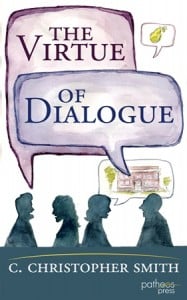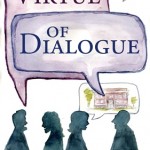 My ebook The Virtue of Dialogue: Conversation as a Hopeful Practice of Church Communities was released last week by Patheos Press, and in it, I argue that open conversation is essential for the health and flourishing of church communities and the places they inhabit.
My ebook The Virtue of Dialogue: Conversation as a Hopeful Practice of Church Communities was released last week by Patheos Press, and in it, I argue that open conversation is essential for the health and flourishing of church communities and the places they inhabit.
Over the next two weeks, I will be running a 10-part series that I am calling “Becoming Conversational” in which I offer suggestions for how churches might enrich the conversational life of their church communities. (Some of these ideas have been adapted from my earlier ebook, Growing Deeper in Our Church Communities, which is available for free download here.
In the spirit of conversation, I encourage readers to utilize the comments section below to ask questions, share relevant stories from their own experience, etc.
#1) Open Existing Church Meetings for Conversation
Most of our churches already many times at which we regularly gather together. Typically, conversation is not a priority for these meetings, however. What if we decided to make our Sunday School classes, small groups, etc. more conversational? Instead of having a teacher stand up and teach us uni-directionally, what if we sought to study and learn in conversation together, leveraging all the gifts inherent in the members of that group? Even if we’re not ready to do away with “the teacher,” adding a time in which the material could be engaged conversationally would be beneficial.
What if we opened up our business and finance meetings so that anyone could attend, and invited conversation and reflection on the choices that need to be made regarding the administration of our life together? All of our churches could learn much from the Society of Friends (Quaker) church communities that have a long and rich history of conversing and making administrative decisions by consensus of the congregation (You can find a good and brief intro here). I’m not saying that all churches should make decisions in this way, rather that the Friends’ process is worth our attention and reflection as we seek to create spaces for meaningful conversation in our churches.
Even more radical perhaps is the suggestion that we create spaces for open conversation in our primary worship gathering. Here at Englewood Christian Church, we are starting to experiment with this through a practice we call “Sharing Time,” an open time for members of the congregation to share burdens, praises and brief reflections for the edification of the whole church. Sharing Time closes with the things that have been shared being lifted up in a congregational time of prayer. Other churches set aside some time after the sermon for questions and conversation about what has been taught.
Our congregations have many opportunities for conversation already in place. All too often, however, we are more interested in entertainment, personal education or organizational efficiency that our forms quench the Spirit’s conversational work in our midst.
Tomorrow… #2 Leveraging the Skills of All Our Members.












